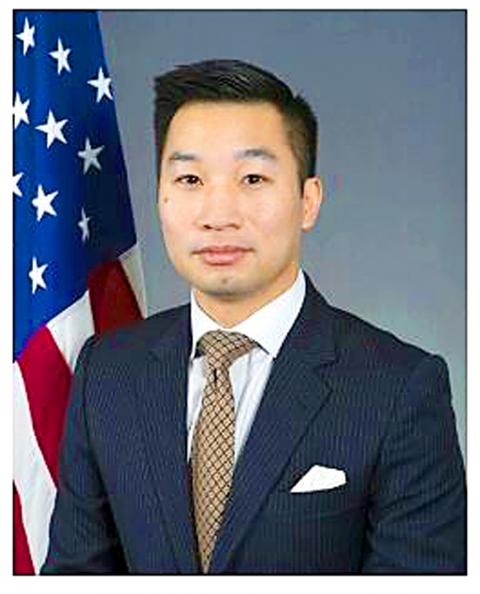A US Department of State official arrived in Taipei last night for a three-day visit, the first to arrive following the enactment of the US’ Taiwan Travel Act on Friday last week.
Alex Wong (黃之瀚), deputy assistant secretary at the Bureau of East Asian and Pacific Affairs, is scheduled to deliver remarks at the American Chamber of Commerce (AmCham) in Taipei’s annual Hsieh Nien Fan (謝年飯) banquet tonight, the American Institute in Taiwan (AIT) said in a news release yesterday.
President Tsai Ing-wen (蔡英文) will also attend the AmCham banquet and deliver a speech.

Photo: screen grab from the US Department of State Web site
Wong is also scheduled to meet with Taiwanese official to discuss various issues connected to Taiwan-US relations, the AIT statement said.
AIT spokeswoman Sonia Urbom dismissed the idea of a link between Wong’s visit and the enactment of the Taiwan Travel Act — which encourages visits by high-level US and Taiwanese officials — saying the trip had been planned for some time.
Wong, a political appointee, took office on Dec. 11 last year. He previously served as foreign policy adviser and general counsel to US Senator Tom Cotton, a Republican.
He was foreign and legal policy director for former Massachusetts governor Mitt Romney’s 2012 presidential campaign, and worked as an adviser to the State Department’s Iraq Rule of Law office from 2007 to 2009.
Sources said Wong is in charge of US President Donald Trump’s Indo-Pacific initiatives.
The Ministry of Foreign Affairs issued a statement welcoming Wong, and said his visit would allow US government agencies to gain a better understanding of Taiwan’s political and economic development, as well as its defense and cross-strait policies.
“Wong’s visit not only underscores the friendship between Taipei and Washington, but is also conducive to deepening the two sides’ partnership,” the ministry said.
The ministry said they would also exchange opinions with Wong on the future development of Taiwan-US ties and the two nations’ cooperation in the Indo-Pacific region.

Tropical Storm Gaemi strengthened into a typhoon at 2pm yesterday, and could make landfall in Yilan County tomorrow, the Central Weather Administration (CWA) said yesterday. The agency was scheduled to issue a sea warning at 11:30pm yesterday, and could issue a land warning later today. Gaemi was moving north-northwest at 4kph, carrying maximum sustained winds near its center of up to 118.8kph and gusts of 154.8kph. The circumference is forecast to reach eastern Taiwan tomorrow morning, with the center making landfall in Yilan County later that night before departing from the north coast, CWA weather forecaster Kuan Shin-ping (官欣平) said yesterday. Uncertainty remains and

SEA WARNING LIKELY: The storm, named Gaemi, could become a moderate typhoon on Wednesday or Thursday, with the Taipei City Government preparing for flooding A tropical depression east of the Philippines developed into a tropical storm named Gaemi at 2pm yesterday, and was moving toward eastern Taiwan, the Central Weather Administration (CWA) said. Gaemi could begin to affect Taiwan proper on Tuesday, lasting until Friday, and could develop into a moderate typhoon on Wednesday or Thursday, it said. A sea warning for Gaemi could be issued as early as Tuesday morning, it added. Gaemi, the third tropical storm in the Pacific Ocean this typhoon season, is projected to begin moving northwest today, and be closest to Taiwan on Wednesday or Thursday, the agency said. Today, there would likely

DISRUPTIONS: The high-speed rail is to operate as normal, while several airlines either canceled flights or announced early departures or late arrivals Schools and offices in 15 cities and counties are to be closed today due to Typhoon Gaemi, local governments announced last night. The 15 are: Taipei, New Taipei City, Taoyuan, Tainan, Keelung, Hsinchu and Kaohsiung, as well as Yilan, Hualien, Hsinchu, Miaoli, Chiayi, Pingtung, Penghu and Lienchiang counties. People should brace for torrential rainfall brought by the storm, with its center forecast to make landfall on the east coast between tonight and tomorrow morning, the Central Weather Administration (CWA) said. The agency issued a sea warning for the typhoon at 11:30pm on Monday, followed by a land warning at 11:30am yesterday. As of

CASUALTY: A 70-year-old woman was killed by a falling tree in Kaohsiung as the premier warned all government agencies to remain on high alert for the next 24 hours Schools and offices nationwide are to be closed for a second day today as Typhoon Gaemi crosses over the nation, bringing torrential rain and whipping winds. Gaemi was forecast to make landfall late last night. From Tuesday night, its outer band brought substantial rainfall and strong winds to the nation. As of 6:15pm last night, the typhoon’s center was 20km southeast of Hualien County, Central Weather Administration (CWA) data showed. It was moving at 19kph and had a radius of 250km. As of 3pm yesterday, one woman had died, while 58 people were injured, the Central Emergency Operation Center said. The 70-year-old